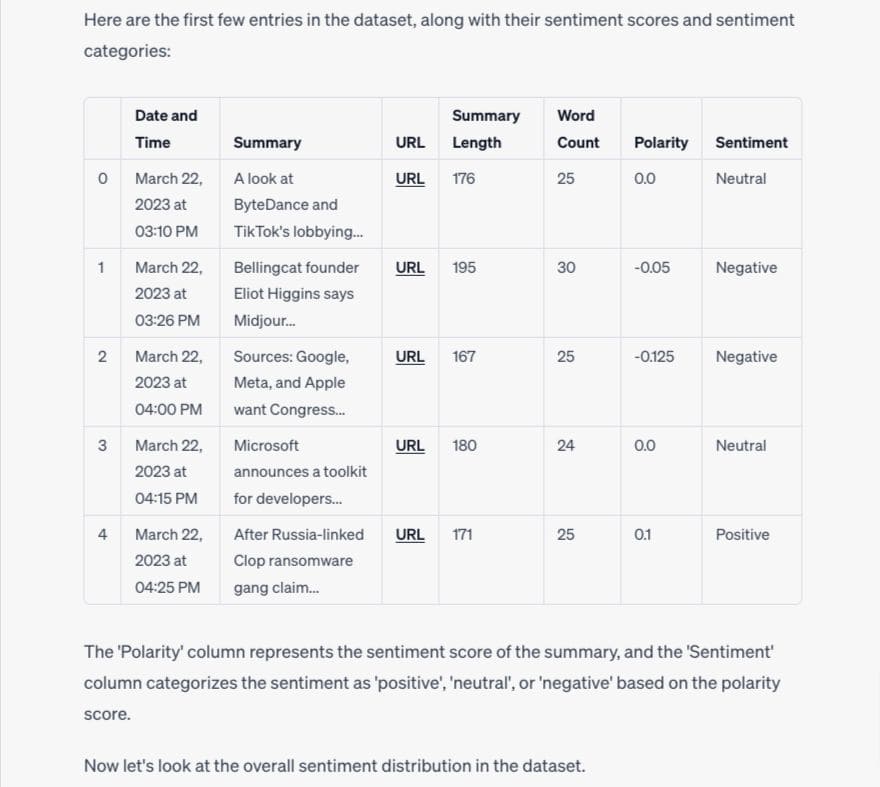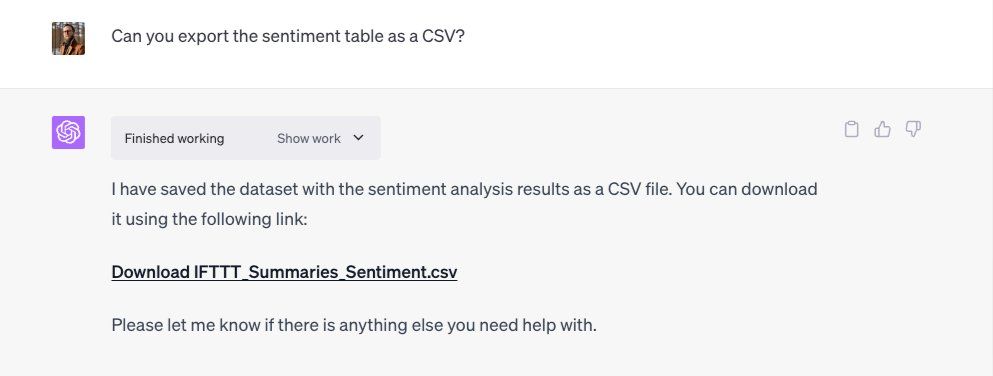ChatGPT Code Interpreter Automates Text Analysis: Say Goodbye to Jupyter Notebook and Python


In Brief
The ChatGPT Code Interpreter offers advanced text analysis capabilities for various applications.
Users can apply various techniques to gain valuable insights, simplifying content analysis processes and enhancing data-driven decisions.
The system can perform sentiment analysis and topic modeling, analyzing Google Sheets and stories, and exporting the analyzed data as CSV files.
Recent tests with the ChatGPT Code Interpreter have opened up new opportunities for complex content analysis. Utilizing the Code Interpreter’s capabilities, users can quickly apply different text analysis techniques to gain insightful knowledge. This development should make content analysis easier to use and better for a variety of applications.

In one experiment, relevant AI stories were gathered using a Google Sheet, and the GPT extension for Sheets generated automatic article summaries. The system intuitively suggested performing sentiment analysis and topic modeling on the summary text after receiving the sheet into the Code Interpreter.
The NLTK library’s VADER (Valence Aware Dictionary for Sentiment Reasoning) sentiment analyzer was suggested by the Code Interpreter for sentiment analysis. VADER was created specifically to deal with the nuances present in social media text, such as emojis and common online slang. A screenshot of the finished table shows how easily the Code Interpreter carried out the sentiment analysis and even provided an explanation of how it worked.

Taking the experiment further, the user requested the Code Interpreter to export the analyzed table back as a CSV file. Remarkably, the system promptly complied, delivering the desired output within approximately three minutes. This efficient workflow demonstrates the Code Interpreter’s ability to facilitate sophisticated content analysis in a user-friendly manner.

Expanding the possibilities, the user sought additional suggestions for text analysis techniques. The Code Interpreter responded with a range of valuable options, each holding the potential for practical applications. These techniques are now accessible to all Code Interpreter users.
- Named Entity Recognition (NER): Identify the names of people, organizations, locations, expressions of times, quantities, monetary values, percentages, etc. in the text. This can provide insights into the most frequently mentioned entities in the article summaries.
- Keyword Extraction: Identify the most important words or phrases in the text using techniques like TF-IDF (Term Frequency-Inverse Document Frequency) or other methods.
- N-gram Analysis: Instead of analyzing single words, examine pairs (bigrams), triplets (trigrams), or n-tuples (n-grams) of words to gain more context. This approach helps identify common phrases or topics within the text.
- Topic Modeling: Utilize statistical models like Latent Dirichlet Allocation (LDA) to uncover abstract “topics” present in a collection of documents. This technique can provide valuable insights into the underlying themes within the summaries.
- Sentiment Over Time: Analyze how the sentiment of the summaries evolves over time. This analysis can reveal patterns, such as variations in positive or negative sentiments across different months or days of the week.
- Text Complexity: Assess the readability of the summaries using metrics like Flesch Reading Ease, Gunning fog index, and more. This analysis can help evaluate the comprehensibility of the content.
- Word Embeddings: Employ word representations, such as Word2Vec or GloVe, to create word embeddings that capture semantic similarities. These embeddings can be used for further analysis or machine learning tasks.
ChatGPT Code Interpreter enables users to streamline their text analysis processes. It automates tasks that previously required manual coding in Python or using tools like Jupyter Notebook and Pandas. This automation saves time and effort, allowing analysts to focus more on deriving insights and making data-driven decisions. It will unlock even more possibilities for extracting valuable knowledge from textual data. Researchers and analysts can expect enhanced features, improved accuracy, and a wider range of analysis techniques at their disposal.
Read more about AI:
Disclaimer
In line with the Trust Project guidelines, please note that the information provided on this page is not intended to be and should not be interpreted as legal, tax, investment, financial, or any other form of advice. It is important to only invest what you can afford to lose and to seek independent financial advice if you have any doubts. For further information, we suggest referring to the terms and conditions as well as the help and support pages provided by the issuer or advertiser. MetaversePost is committed to accurate, unbiased reporting, but market conditions are subject to change without notice.
About The Author
Damir is the team leader, product manager, and editor at Metaverse Post, covering topics such as AI/ML, AGI, LLMs, Metaverse, and Web3-related fields. His articles attract a massive audience of over a million users every month. He appears to be an expert with 10 years of experience in SEO and digital marketing. Damir has been mentioned in Mashable, Wired, Cointelegraph, The New Yorker, Inside.com, Entrepreneur, BeInCrypto, and other publications. He travels between the UAE, Turkey, Russia, and the CIS as a digital nomad. Damir earned a bachelor's degree in physics, which he believes has given him the critical thinking skills needed to be successful in the ever-changing landscape of the internet.
More articles

Damir is the team leader, product manager, and editor at Metaverse Post, covering topics such as AI/ML, AGI, LLMs, Metaverse, and Web3-related fields. His articles attract a massive audience of over a million users every month. He appears to be an expert with 10 years of experience in SEO and digital marketing. Damir has been mentioned in Mashable, Wired, Cointelegraph, The New Yorker, Inside.com, Entrepreneur, BeInCrypto, and other publications. He travels between the UAE, Turkey, Russia, and the CIS as a digital nomad. Damir earned a bachelor's degree in physics, which he believes has given him the critical thinking skills needed to be successful in the ever-changing landscape of the internet.






















































